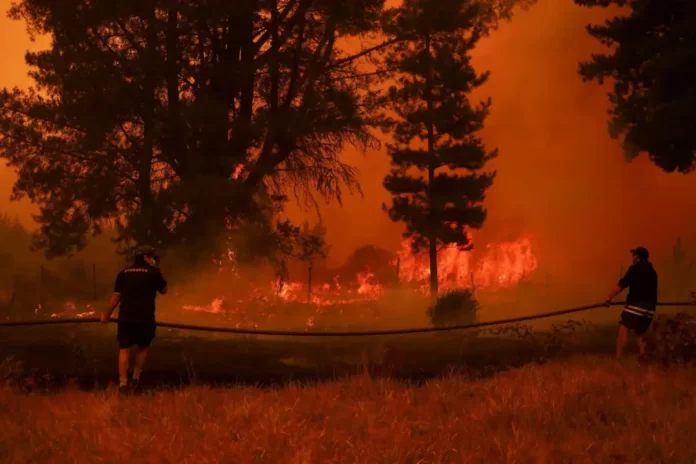Chile is reeling from the aftermath of its deadliest forest fires in recent memory, a catastrophic event that has claimed the lives of at least 112 people and left vast swathes of land charred and desolate. The infernos, which erupted with unprecedented ferocity across multiple regions, have plunged the South American nation into mourning and prompted a massive humanitarian response as authorities grapple with the scale of the devastation.
The forest fires, described by officials as the worst disaster to strike Chile since the devastating earthquake of 2010, erupted in various parts of the country, fueled by strong winds, dry conditions, and soaring temperatures. The blazes spread rapidly, engulfing homes, forests, and entire communities in their path, leaving a trail of destruction in their wake.
The toll of human life has been staggering, with scores of people perishing in the flames as they attempted to flee their homes or rescue loved ones trapped in the inferno. Many of the victims were unable to escape in time, succumbing to the intense heat and smoke as the fires engulfed their properties and engulfed everything in their path.
The sheer scale of the disaster has overwhelmed emergency responders and strained resources as firefighters battle tirelessly to contain the blazes and prevent further loss of life and property. Helicopters and aerial water tankers have been deployed to douse the flames from above, while ground crews work around the clock to extinguish hotspots and prevent the fires from spreading.
The forest fires have also taken a heavy toll on Chile’s environment, destroying vast tracts of pristine wilderness and threatening endangered species that call these ecosystems home. The ecological impact of the blazes is expected to be profound, with long-lasting consequences for biodiversity, soil fertility, and water resources in the affected areas.
In addition to the loss of life and environmental damage, the forest fires have wreaked havoc on Chile’s economy, decimating livelihoods and disrupting key industries such as agriculture, tourism, and forestry. The destruction of crops, livestock, and infrastructure has dealt a severe blow to rural communities, many of which were already grappling with the economic fallout of the COVID-19 pandemic.
The scale of the disaster has prompted an outpouring of support and solidarity from the international community, with countries around the world offering assistance and resources to aid in Chile’s recovery efforts. Humanitarian organizations have mobilized relief efforts, providing emergency supplies, shelter, and medical assistance to those affected by the fires.
As Chile mourns the loss of life and begins the arduous task of rebuilding, questions are being raised about the underlying causes of the forest fires and the government’s response to the crisis. Critics have pointed to factors such as climate change, deforestation, and inadequate forest management as contributing to the severity of the blazes, calling for urgent action to address these root causes and prevent future disasters.
In response to the crisis, Chilean President Sebastian Piñera has declared a state of emergency in the affected regions and pledged to mobilize all available resources to support firefighting efforts and assist those impacted by the fires. The government has also launched an investigation into the cause of the blazes and announced plans to implement measures to strengthen forest protection and emergency response capabilities.
The forest fires in Chile serve as a stark reminder of the urgent need for global action to address the growing threat of climate change and its impact on vulnerable communities around the world. As extreme weather events become increasingly frequent and severe, the need for concerted efforts to mitigate the risks and build resilience has never been more pressing.
As Chile mourns the loss of life and begins the process of rebuilding, the international community must stand in solidarity with the country and support its efforts to recover from this devastating disaster. By working together to address the root causes of forest fires and build more sustainable and resilient communities, we can help ensure a safer and more secure future for all.

